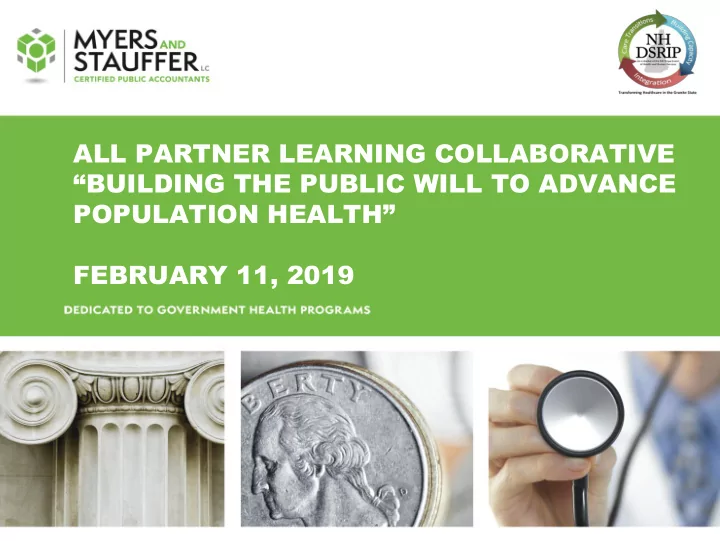

ALL PARTNER LEARNING COLLABORATIVE “BUILDING THE PUBLIC WILL TO ADVANCE POPULATION HEALTH” FEBRUARY 11, 2019
LEARNING COLLABORATIVE GOAL • This learning collaborative is designed to help the audience to learn and apply evidence-based strategies to make the case to advance population health and health equity. 2
LEARNING COLLABORATIVE OBJECTIVES 1. Recognize both the challenges and the importance of building public will to address population health 2. Rethink how they are currently making the case for population health 3. Identify areas where their casemaking could be leveraged to strengthen public support using evidence-based strategies 4. Describe methods of using data to build public support for population health programs and health system transformation 3
AGENDA FOR TODAY Introduction Catherine Snider, MSLC. (10 minutes) "Addressing Population Health and Health Equity Through Delivery System Reform.“ Kelley Capuchino, DHHS. (10 minutes) Keynote address, “Leveraging Our Data to Advance Population Health: The Urgency to Build Public Will.” Tiffany Manuel, PhD. (90 minutes) Break (10 minutes) Casemaking Exercise (60 minutes) Wrap-up, Q&A, and Next Steps (20 minutes) 4
DSRIP SPOTLIGHT The Mental Health Center of Greater Manchester – Integration Enhancement Project • An individual came through the REAP program (Referral, Education, Assistance and Prevention Program for Older Adults and Their Caregivers) in August with multiple needs including mental health issues and alcohol use, involuntary admission to the Cypress Center DRF, poor physical health, cognitive decline, and little to no social and family supports. The individual was facing immediate eviction and exhibited behavior that indicated they may be at risk of harm to themselves. • Network4Health (IDN 4) partners followed through with the individual’s care. Now the individual • is in recovery and has been for almost four months • attends PCP appointments and has a number of community supports in place • has not expressed any signs of self harm for almost four months • The partners involved were The Mental Health Center of Greater Manchester including REAP, Emergency Services, Mobile Crisis Response, Cypress Center, Integrated Treatment Team, and North End Counseling; New Horizons; Manchester Community Health Center; Elliot Hospital; Catholic Medical Center; The Way Home; Manchester Housing; and DHHS. 5
LEARNING COLLABORATIVE CONNECTIONS Building the Performance Behavioral Alternative Using Social Public Will to Measurement Health Payment Be the Change Determinants Sustainability Advance and Quality Integration Models of Health Population Outcomes Health B1 B1 B1 B1 B1 B1 B1 6
Kelley Capuchino KELLEY CAPUCHINO KELLEY CAPUCHINO • Kelley Capuchino is a Senior Policy Analyst in the Division for Behavioral Health in the Department of Health and Human Services. • She serves as the Administrator of the state’s Building Capacity for Transformation waiver, leading primary and behavioral health providers toward continued health- care integration including social determinants of health. • Her background includes Medicaid policy and planning primarily focused on service delivery and supports for individuals with serious mental illness, Medicaid and multi-payer data analysis, implementation of evidence-based practices, integrated primary and behavioral health services, and children’s systems of care. In addition to this transformation waiver she has overseen the design and implementation of two key demonstration initiatives during her tenure at DHHS including: o New Hampshire’s Healthy Choices Healthy Changes and Breath Well Live Well project; evaluating the impact of cash incentives on participation and health outcomes among program participants; o The Balancing Incentive Program focused on shifting long term care spending from institution to community long term supports and services. • She is always passionate about her work and is primarily focused on improving the lives of the people that we all serve. 7
ADDRESSING POPULATION HEALTH AND HEALTH EQUITY THROUGH DELIVERY SYSTEM REFORM 8
PROJECT OBJECTIVES STC 23 “Creating appropriate behavioral health capacity in order to expand effective community based- treatment models; reduce unnecessary use of emergency rooms and hospitals as the site of care for individuals with behavioral health issues; and support prevention through screening, early intervention, and population health management initiatives. ” 9
Delivery System Reform: Setting the Goal Improved Improved Transitions of Referral Care Systems Health Outcome Increased Measurement Treatment and Coordination Improvement 10
LEARNING COLLABORATIVE DEFINITIONS Population health – an approach to health that aims to improve the health of a population. Public health works to improve the health of communities through policy recommendations, health education, and research for disease detection and injury prevention. Health equity means that everyone has a fair opportunity to live a long, healthy life. Population health data identifies health disparities that health equity addresses, often outside of the traditional health care system. 11
POPULATION HEALTH EXAMPLES People with chronic illnesses Geographic area, for example, health by zip code or by county People with housing insecurity Individuals on Medicaid Disease Management Diabetes Integrated Care Management Serious mental illness, complex medical conditions, social determinants 12
POPULATION HEALTH DATA IN NH Differences in Health Outcomes within States by Place and Racial/Ethnic Groups http://www.countyhealthrankings.org/explore-health- rankings/reports/state-reports/2018/new-hampshire How Do Counties Rank for Health Outcomes? 13
People with addiction Admissions, Chronically ill Discharges, people with & Transfers BH issues DSRIP People with Medicaid Dual Attributed Diagnosis Lives Other groups 14
DR TI DR TIFFANY FFANY MANUE MANUEL • Dr. Tiffany Manuel is President and CEO of TheCaseMade Incorporated, which helps leaders transform communities. • Dr. Manuel is an expert in leveraging data to build public will and the issues of community development, social change, and cross-sector partnerships. • She holds doctorate and master’s degrees in public policy from the University of Massachusetts Boston, a master’s degree in political science from Purdue University, and a bachelor’s degree from the University of Chicago. 15
Recommend
More recommend